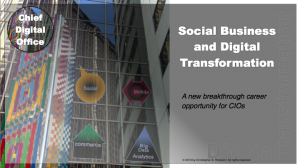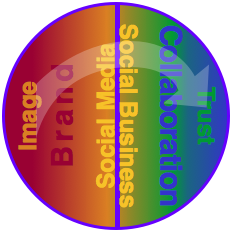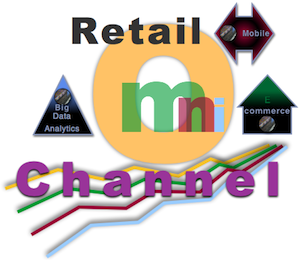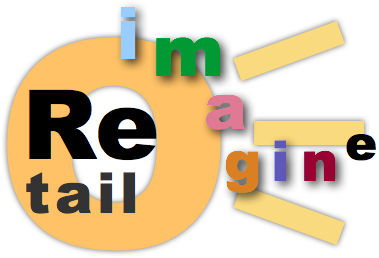Chief Digital Officer Needs Analysis is an executive summary of how CSRA helps organizations assess their need for “going digital” and hiring digital executives. These engagements serve as “requirements analysis” for an enterprise, business or brand.
Improving the Selection Process for Digital Executives
 Astute CEOs and boards of established firms and brands are awakening to an increasingly uncomfortable reality: for many, business results have been flat, and customers are behaving “unpredictably.” Since this is such a prevalent trend, there is emerging consensus that “going digital” is the way to get closer to customers(1) and revitalize business. CEOs or board members get on the phone to their executive recruiter to search for a Chief Digital Officer, a “digital CMO,” or maybe a digital-savvy CIO to lead digital transformation. As we’ll see, in so doing they are too often putting the cart before the horse. They will get better results by assessing their needs for digital expertise first, so I’ll offer a simple yet robust needs assessment process. Astute CEOs and boards of established firms and brands are awakening to an increasingly uncomfortable reality: for many, business results have been flat, and customers are behaving “unpredictably.” Since this is such a prevalent trend, there is emerging consensus that “going digital” is the way to get closer to customers(1) and revitalize business. CEOs or board members get on the phone to their executive recruiter to search for a Chief Digital Officer, a “digital CMO,” or maybe a digital-savvy CIO to lead digital transformation. As we’ll see, in so doing they are too often putting the cart before the horse. They will get better results by assessing their needs for digital expertise first, so I’ll offer a simple yet robust needs assessment process.
Although CSRA’s client work shows accelerating digital […]
 Why Machines Won’t Displace Human Workers in the Knowledge Economy is a short thought experiment, in the spirit of all Noodles, which was in response to a post in Wired. In Here’s How to Keep the Robots From Stealing Our Jobs, John Hagel posited that a major rationale for the Knowledge Economy firm would be its role as a “knowledge platform” that enabled people to accelerate their learning and productivity. I highly recommend the post, which sparked many intelligent comments. Why Machines Won’t Displace Human Workers in the Knowledge Economy is a short thought experiment, in the spirit of all Noodles, which was in response to a post in Wired. In Here’s How to Keep the Robots From Stealing Our Jobs, John Hagel posited that a major rationale for the Knowledge Economy firm would be its role as a “knowledge platform” that enabled people to accelerate their learning and productivity. I highly recommend the post, which sparked many intelligent comments.
It’s obvious that many people are having difficulties imagining the world toward which we are hurtling, a world in which machines are getting “smarter” and able to “compete” for work roles that humans now do. In writing The Social Channel App, I thought long and hard about the Knowledge Economy and people’s roles in it, and its main thesis is that everything, from states and enterprises to people and products, will be differentiated in the Social Channel and that “humanness” will assume a much more visible importance in the economy.
[…]
 CIO Guide to CDOs and Digital Transformation summarizes a presentation I gave to TechLeaders Association, a Chicago-based CIO group. It will brief you on how digitally empowered B2C and B2B customers are forcing change on enterprises by demanding seamless interactions across digital and analog interfaces, the rise of the Chief Digital Officer and how CIOs can use this disruption to their advantage. Omni-channel will become the new normal in industries in which a leader provides the omni-channel experience and raises the bar. While explaining omni-channel, I asked the room how many had abandoned transactions with ecommerce or mobile sites because they were too difficult to use, and 40% raised their hands. When leaders field their omni-channel experiences, customers will reject laggards en masse. CIOs can use these developments to their advantage, and the CIO Guide to CDOs and Digital Transformation shows how. CIO Guide to CDOs and Digital Transformation summarizes a presentation I gave to TechLeaders Association, a Chicago-based CIO group. It will brief you on how digitally empowered B2C and B2B customers are forcing change on enterprises by demanding seamless interactions across digital and analog interfaces, the rise of the Chief Digital Officer and how CIOs can use this disruption to their advantage. Omni-channel will become the new normal in industries in which a leader provides the omni-channel experience and raises the bar. While explaining omni-channel, I asked the room how many had abandoned transactions with ecommerce or mobile sites because they were too difficult to use, and 40% raised their hands. When leaders field their omni-channel experiences, customers will reject laggards en masse. CIOs can use these developments to their advantage, and the CIO Guide to CDOs and Digital Transformation shows how.
[…]
Using Social Media and Social Business Together to Evolve Experience reveals differences between “the two socials,” and its startling conclusion is that most businesses will benefit from keeping them separate but related during the next three years.
 [Updated] There’s a much deeper context that makes the two socials vital: many of the assumptions on which business is built are being completely disrupted. For only one example, as Chief Marketer myself, I used to follow the mantra, “We always want to show our brand in the most positive light” (even when we’re lackluster). That impulse is increasingly risky. Take a few minutes and reflect on how profound that change is. Entire marketing and public relations industries are built on it, and it is very risky because people reveal the obfuscation and half-truths that used to work. There is no such thing as a “half” truth. [Updated] There’s a much deeper context that makes the two socials vital: many of the assumptions on which business is built are being completely disrupted. For only one example, as Chief Marketer myself, I used to follow the mantra, “We always want to show our brand in the most positive light” (even when we’re lackluster). That impulse is increasingly risky. Take a few minutes and reflect on how profound that change is. Entire marketing and public relations industries are built on it, and it is very risky because people reveal the obfuscation and half-truths that used to work. There is no such thing as a “half” truth.
From a practical standpoint, organizations need to manage their way through the transition to pervasive transparency, pacing their evolution with changing stakeholder expectations. This is where social media and social […]
Digital Transformation’s Personal Issue reveals personal treatment to be the key to breakthrough customer experience, and it shows how digital social spaces enable Chief Digital Officers to use personal treatment to create more profit. Before they arrive, though, they need to lead their organizations through the Personal Issue. 
The Personal Issue refers to a perceived conflict between empowered customers and profit-starved companies. Digital social technologies are enabling customers to “re-personalize” business and society because their online interactions among themselves are personal, which is changing their expectations of all interactions.
However, businesses resist treating customers personally because they fear cost and inefficiency. They don’t understand the digital social economics of treating customers personally online, at scale.
Meanwhile, the missions of chief digital officers (CDOs) and chief customer officers (CCOs) are creating bold new “customer experience” and profits by using digital technologies to transform organizations, brands and businesses. They will fulfill their missions far more quickly and completely by using the key.
[…]
 The rise of design signaled the fall of Nokia, RIM and Motorola describes how engineering is becoming less important in distinguishing hightech and other products from each other. It also presages a seismic shift away from product towards customer experience in determining market leaders for people-oriented products and services. A very large portion of product companies will follow in the footsteps of these three former mobile phone titans unless they transform their focus from product features (engineering) to customer experience (design). The rise of design signaled the fall of Nokia, RIM and Motorola describes how engineering is becoming less important in distinguishing hightech and other products from each other. It also presages a seismic shift away from product towards customer experience in determining market leaders for people-oriented products and services. A very large portion of product companies will follow in the footsteps of these three former mobile phone titans unless they transform their focus from product features (engineering) to customer experience (design).
By no means do I imply that engineering is not important—in fact, it is more important than ever—I assert that it is less important than design in differentiating people-oriented products. Engineering is abstracted away from the customer/user of the product, and design explicitly addresses how the customer uses the product to attain outcome(s).
Design is to the Knowledge Economy what engineering was to the Industrial Economy.
[…]
 Omni-Channel Retail, Mobile and Big Data offers tantalizing glimpses into current and future omni-channel retail trends and technologies. I “sat down” with three thought leaders and a crowd of smart people on AllAnalytics’ real-time webcast, which featured real-time Q&A with the panelists afterward. You can watch it here. Omni-Channel Retail, Mobile and Big Data offers tantalizing glimpses into current and future omni-channel retail trends and technologies. I “sat down” with three thought leaders and a crowd of smart people on AllAnalytics’ real-time webcast, which featured real-time Q&A with the panelists afterward. You can watch it here.
Panelists Dr. Erik Brynjolfsson, Dr. Yu Jeffrey Hu and Dr. Mohammad Saifur Rahman collaborate on numerous projects, and they are intensely interested in retail transformation. They also referenced one of their recent papers, Competing in the Age of Omnichannel Retailing, and I have added some of its points here as well. The webcast was well moderated by AllAnaytics’ Noreen Seebacher and Beth Schultz.
Although it wasn’t discussed in depth, I observe that big data is especially poignant to retailers for two reasons: they have extremely rich internal, proprietary transaction data on customers (loyalty cards, credit cards, returns information, call center information, service information) and retail customers are the most free-wheeling online. Retail customers discuss their experiences in situations in which they use most types of products. This gives retailers priceless […]
 Hightech and U.S. Healthcare Transformation recaps The Future of Healthcare: How Technology is Enabling New Models of Healthcare Delivery, which was cosponsored by Katten Muchin Rosenmann and the Illinois Technology Association. The seminar featured five panelists with various points of view: two CEOs of healthcare start-ups, one venture capitalist, one healthcare management consultant and a healthcare attorney. Hightech and U.S. Healthcare Transformation recaps The Future of Healthcare: How Technology is Enabling New Models of Healthcare Delivery, which was cosponsored by Katten Muchin Rosenmann and the Illinois Technology Association. The seminar featured five panelists with various points of view: two CEOs of healthcare start-ups, one venture capitalist, one healthcare management consultant and a healthcare attorney.
The consensus was that, at long last, U.S. healthcare is going to progress beyond the waiting room; a perfect storm of market forces and technology enablement has created the conditions for significant reform. Regulations are balancing privacy, protections and digitization, and start-ups are attacking pockets of inefficiency, often through mobile applications and cloud solutions. Technology empowers patients and providers because information is increasingly available real-time. Information enables patients to be more aware of their health as well as the ramifications of their decisions, and it can improve collaboration between provider and patient.
Government is a major change agent; the U.S. taxpayer is footing a higher and higher bill, and healthcare has absorbed all wage gains for many years now, effectively preventing Americans from improving their quality of life. Read on for my […]
 [UPDATED] The Future of the Retail Store in the Omni-Channel Age is third in CSRA’s retail & omni-channel series, and it is especially relevant to Chief Digital Officers, who orchestrate profound organization change using digital technologies and processes. It also offers rare opportunity to high-stakes CMOs. Part1 of The Future of the Retail Store outlines several aspects of market disruption that are affecting retailers as a group, albeit by varying degrees. Part2 features examples of “reimagining retail” for mobile, banking, grocery, hardware and apparel “stores.” [UPDATED] The Future of the Retail Store in the Omni-Channel Age is third in CSRA’s retail & omni-channel series, and it is especially relevant to Chief Digital Officers, who orchestrate profound organization change using digital technologies and processes. It also offers rare opportunity to high-stakes CMOs. Part1 of The Future of the Retail Store outlines several aspects of market disruption that are affecting retailers as a group, albeit by varying degrees. Part2 features examples of “reimagining retail” for mobile, banking, grocery, hardware and apparel “stores.”
“Future” provides practical examples for the main thesis carried through the series: retailers can thrive by thinking beyond “the product” and its selection, assortment, pricing, etc., because these have a decreasing impact on revenue and profit. Digital social enables customers and retailers to focus on how customers create value with products and services, so when properly used, social is a strong profit driver, and profits are what retailers need to survive and thrive. As examples illustrate, retailers can go with the “showrooming” trend by enabling customers to imagine […]
 Chicago-Style Innovation is my notes from Lightbank Innovation Day, which took place on 9 May 2013 at the City Winery (presentations) and Lightbank’s offices (networking). Throughout the day, it was obvious that the Knowledge Economy’s Social Channel was unfolding; entrepreneurs’ startups are stripping off an increasing breadth of enterprise processes and using digital social software to improve them. For example, Needle’s platform creates experts in user (customer) use cases and outcomes that outperform anyone at retail; Fieldglass, HighGround, Fooda, oDesk and TalentBin take aim at various parts of human capital while Aon Hewitt showed how to practice enterprise innovation on the inside; DoubleDutch aims to [at long last] digitize trade shows and conferences through its platform’s geosocial functions. Sprout Social and Contently offered social tools. Chicago-Style Innovation is my notes from Lightbank Innovation Day, which took place on 9 May 2013 at the City Winery (presentations) and Lightbank’s offices (networking). Throughout the day, it was obvious that the Knowledge Economy’s Social Channel was unfolding; entrepreneurs’ startups are stripping off an increasing breadth of enterprise processes and using digital social software to improve them. For example, Needle’s platform creates experts in user (customer) use cases and outcomes that outperform anyone at retail; Fieldglass, HighGround, Fooda, oDesk and TalentBin take aim at various parts of human capital while Aon Hewitt showed how to practice enterprise innovation on the inside; DoubleDutch aims to [at long last] digitize trade shows and conferences through its platform’s geosocial functions. Sprout Social and Contently offered social tools.
Presenters Gian Fulgoni, J Schwan and Ramon De Leon shared valuable advice for entrepreneurs, investors and enterprise executives. Fulgoni provided statistics that showed how mobile was eclipsing ecommerce and analog commerce; Schwan opened the audience’s eyes to Ubiquitous Computing and the Internet of Things, and De Leon showed the power of (pervasively ;^) being yourself.
[…]
|
|
 Astute CEOs and boards of established firms and brands are awakening to an increasingly uncomfortable reality: for many, business results have been flat, and customers are behaving “unpredictably.” Since this is such a prevalent trend, there is emerging consensus that “going digital” is the way to get closer to customers(1) and revitalize business. CEOs or board members get on the phone to their executive recruiter to search for a Chief Digital Officer, a “digital CMO,” or maybe a digital-savvy CIO to lead digital transformation. As we’ll see, in so doing they are too often putting the cart before the horse. They will get better results by assessing their needs for digital expertise first, so I’ll offer a simple yet robust needs assessment process.
Astute CEOs and boards of established firms and brands are awakening to an increasingly uncomfortable reality: for many, business results have been flat, and customers are behaving “unpredictably.” Since this is such a prevalent trend, there is emerging consensus that “going digital” is the way to get closer to customers(1) and revitalize business. CEOs or board members get on the phone to their executive recruiter to search for a Chief Digital Officer, a “digital CMO,” or maybe a digital-savvy CIO to lead digital transformation. As we’ll see, in so doing they are too often putting the cart before the horse. They will get better results by assessing their needs for digital expertise first, so I’ll offer a simple yet robust needs assessment process.
 Why Machines Won’t Displace Human Workers in the Knowledge Economy is a short thought experiment, in the spirit of all Noodles, which was in response to a post in Wired. In Here’s How to Keep the Robots From Stealing Our Jobs, John Hagel posited that a major rationale for the Knowledge Economy firm would be its role as a “knowledge platform” that enabled people to accelerate their learning and productivity. I highly recommend the post, which sparked many intelligent comments.
Why Machines Won’t Displace Human Workers in the Knowledge Economy is a short thought experiment, in the spirit of all Noodles, which was in response to a post in Wired. In Here’s How to Keep the Robots From Stealing Our Jobs, John Hagel posited that a major rationale for the Knowledge Economy firm would be its role as a “knowledge platform” that enabled people to accelerate their learning and productivity. I highly recommend the post, which sparked many intelligent comments. CIO Guide to CDOs and Digital Transformation summarizes a presentation I gave to TechLeaders Association, a Chicago-based CIO group. It will brief you on how digitally empowered B2C and B2B customers are forcing change on enterprises by demanding seamless interactions across digital and analog interfaces, the rise of the Chief Digital Officer and how CIOs can use this disruption to their advantage. Omni-channel will become the new normal in industries in which a leader provides the omni-channel experience and raises the bar. While explaining omni-channel, I asked the room how many had abandoned transactions with ecommerce or mobile sites because they were too difficult to use, and 40% raised their hands. When leaders field their omni-channel experiences, customers will reject laggards en masse. CIOs can use these developments to their advantage, and the CIO Guide to CDOs and Digital Transformation shows how.
CIO Guide to CDOs and Digital Transformation summarizes a presentation I gave to TechLeaders Association, a Chicago-based CIO group. It will brief you on how digitally empowered B2C and B2B customers are forcing change on enterprises by demanding seamless interactions across digital and analog interfaces, the rise of the Chief Digital Officer and how CIOs can use this disruption to their advantage. Omni-channel will become the new normal in industries in which a leader provides the omni-channel experience and raises the bar. While explaining omni-channel, I asked the room how many had abandoned transactions with ecommerce or mobile sites because they were too difficult to use, and 40% raised their hands. When leaders field their omni-channel experiences, customers will reject laggards en masse. CIOs can use these developments to their advantage, and the CIO Guide to CDOs and Digital Transformation shows how. [Updated] There’s a much deeper context that makes the two socials vital: many of the assumptions on which business is built are being completely disrupted. For only one example, as Chief Marketer myself, I used to follow the mantra, “We always want to show our brand in the most positive light” (even when we’re lackluster). That impulse is increasingly risky. Take a few minutes and reflect on how profound that change is. Entire marketing and public relations industries are built on it, and it is very risky because people reveal the obfuscation and half-truths that used to work. There is no such thing as a “half” truth.
[Updated] There’s a much deeper context that makes the two socials vital: many of the assumptions on which business is built are being completely disrupted. For only one example, as Chief Marketer myself, I used to follow the mantra, “We always want to show our brand in the most positive light” (even when we’re lackluster). That impulse is increasingly risky. Take a few minutes and reflect on how profound that change is. Entire marketing and public relations industries are built on it, and it is very risky because people reveal the obfuscation and half-truths that used to work. There is no such thing as a “half” truth.
 Omni-Channel Retail, Mobile and Big Data offers tantalizing glimpses into current and future omni-channel retail trends and technologies. I “sat down” with three thought leaders and a crowd of smart people on AllAnalytics’ real-time webcast, which featured real-time Q&A with the panelists afterward. You can watch it here.
Omni-Channel Retail, Mobile and Big Data offers tantalizing glimpses into current and future omni-channel retail trends and technologies. I “sat down” with three thought leaders and a crowd of smart people on AllAnalytics’ real-time webcast, which featured real-time Q&A with the panelists afterward. You can watch it here. Hightech and U.S. Healthcare Transformation recaps The Future of Healthcare: How Technology is Enabling New Models of Healthcare Delivery, which was cosponsored by Katten Muchin Rosenmann and the Illinois Technology Association. The seminar featured five panelists with various points of view: two CEOs of healthcare start-ups, one venture capitalist, one healthcare management consultant and a healthcare attorney.
Hightech and U.S. Healthcare Transformation recaps The Future of Healthcare: How Technology is Enabling New Models of Healthcare Delivery, which was cosponsored by Katten Muchin Rosenmann and the Illinois Technology Association. The seminar featured five panelists with various points of view: two CEOs of healthcare start-ups, one venture capitalist, one healthcare management consultant and a healthcare attorney. [UPDATED] The Future of the Retail Store in the Omni-Channel Age is third in CSRA’s retail & omni-channel series, and it is especially relevant to Chief Digital Officers, who orchestrate profound organization change using digital technologies and processes. It also offers rare opportunity to high-stakes CMOs. Part1 of The Future of the Retail Store outlines several aspects of market disruption that are affecting retailers as a group, albeit by varying degrees. Part2 features examples of “reimagining retail” for mobile, banking, grocery, hardware and apparel “stores.”
[UPDATED] The Future of the Retail Store in the Omni-Channel Age is third in CSRA’s retail & omni-channel series, and it is especially relevant to Chief Digital Officers, who orchestrate profound organization change using digital technologies and processes. It also offers rare opportunity to high-stakes CMOs. Part1 of The Future of the Retail Store outlines several aspects of market disruption that are affecting retailers as a group, albeit by varying degrees. Part2 features examples of “reimagining retail” for mobile, banking, grocery, hardware and apparel “stores.” Chicago-Style Innovation is my notes from Lightbank Innovation Day, which took place on 9 May 2013 at the City Winery (presentations) and Lightbank’s offices (networking). Throughout the day, it was obvious that the Knowledge Economy’s Social Channel was unfolding; entrepreneurs’ startups are stripping off an increasing breadth of enterprise processes and using digital social software to improve them. For example, Needle’s platform creates experts in user (customer) use cases and outcomes that outperform anyone at retail; Fieldglass, HighGround, Fooda, oDesk and TalentBin take aim at various parts of human capital while Aon Hewitt showed how to practice enterprise innovation on the inside; DoubleDutch aims to [at long last] digitize trade shows and conferences through its platform’s geosocial functions. Sprout Social and Contently offered social tools.
Chicago-Style Innovation is my notes from Lightbank Innovation Day, which took place on 9 May 2013 at the City Winery (presentations) and Lightbank’s offices (networking). Throughout the day, it was obvious that the Knowledge Economy’s Social Channel was unfolding; entrepreneurs’ startups are stripping off an increasing breadth of enterprise processes and using digital social software to improve them. For example, Needle’s platform creates experts in user (customer) use cases and outcomes that outperform anyone at retail; Fieldglass, HighGround, Fooda, oDesk and TalentBin take aim at various parts of human capital while Aon Hewitt showed how to practice enterprise innovation on the inside; DoubleDutch aims to [at long last] digitize trade shows and conferences through its platform’s geosocial functions. Sprout Social and Contently offered social tools.